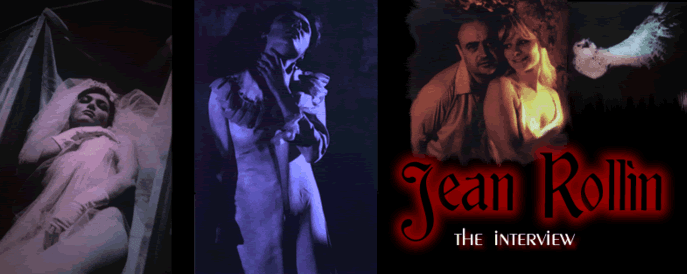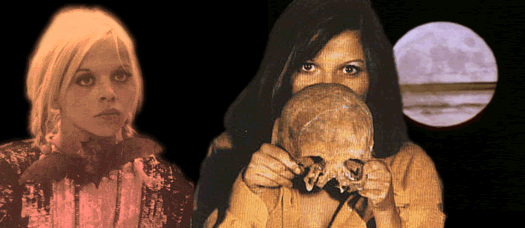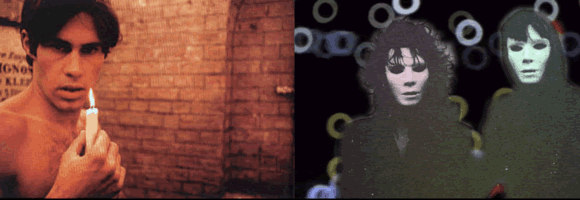
The stories of many of your films resemble classic fairy tales and comic books. Do you think these are a strong influence, and do you have any particular favorites?
I am certainly under the influence from the time when I was young. At this period, there was no TV, and after school, we read comics and all that sort of thing. Our favorites were Mandrake the Magician, Zorro, and the serials like Nyoka the Jungle Girl, Mysterious Doctor Satan, G-Men vs. the Black Dragon, etc. All those things were fascinated us, and of course it all came back in my films. When I shoot a film, I'm a 15 year old boy again.
Your visual style is very Gothic and yet modern at the same time. You've named some of your favorite painters like Clovis Trouille, but are there any art movements or trends you are fond of or feel are influences?
Certainly the surrealists. Painters like Max Ernst and [Rene] Magritte, and also the surrealist from Belgium, Paul Delvaux. The way he uses female nudity probably influences the eroticism of my films. (No "bed" sequences, but nudity in strange places.)
Your first major film, Le Viol du Vampire, was not greeted well by critics. How do you feel the critics treat you know? Do you feel vindicated now that you are admired by fans all around the world?
I was very surprised by the hatred of the critics for my first film. Now I am surprised by the admiration people today have for Le Viol. In fact, it's a kind of Dadaist film.
A number of films have been named as your "best," such as Levres de Sang, Fascination, La Morte Vivante. Do you have a favorite film, or a film which best sums up your philosophy?
The next one, of course! But I have a little something for Requiem for a Vampire because it's a "naive" film. My best script is certainly Levres de Sang, and my best directing, The Two Orphan Vampires.
Some of your films like Le Frisson des Vampires, Requiem pour un Vampire, and La Morte Vivante are very different in other countries like Spain, Germany, etc. (different music, different scenes, etc.). Have you ever worked on these different versions of your films, and how do they come about?
It's a shame some put in the films sequences I don't shoot. I never saw such versions, but some people told me about it. There is only one version. I have supervised personally the versions Image Entertainment does.
Do you have any film or writing projects coming up since Les Deux Orphelines Vampires?
Bride of Dracula. I hope to shoot it this year.
The music in your films is remarkable, especially your work with Philippe d'Aram. How closely do you work with him on the sound of the music, and how much influence do you have on the musical choices in the film's final cut?
I am not a musician at all. Philippe D'Aram is perfect for me; he understands what I want only with my poor explanations and makes a music with the mood, the spirit I try to put in the images. He has a sensibility close to mine.
Of the erotic films you have done, such as Phantasmes or Tout le Monde il en a Deux, are there any you are proud of or that you think are as good as your other films?
Not really; but it's impossible for me to shoot a film, even a sex film, without a little love for it. I like some parts of Phantasmes, some parts of Tout le Monde, some parts of Jeunes Filles Impudiques. Not all of the films, but some parts.
You used the beautiful Italian actress Marina Pierro for "La Morte Vivante." What was it like working with her?
I met Marina at the Sitges Film Festival in Spain. Accidentally, I met her agent when I was preparing La Morte Vivante. She proposed Marina to me, and I said yes. She had a strong personality, and that was what I needed for the character.
Some of your best films feature Brigitte Lahaie. Would you say that you were responsible for bringing her into mainstream cinema? Do you two still remain closely in touch?
Brigitte is still a friend. We were togetehr at the San Sebastian festival, and at the convention in New York. The first time I met her was on an "X" film. In my mind, I said: "This girl is strange. She can play in the kind of films I shoot." And I took her a film of the kind I wanted to do; it was Raisins de la Mort. In that film, she has a great "presence."
Your work seems influenced by some classical directors like Fritz Lang, by surrealist painters, and by many novelists. Are there are any current filmmakers or writers you enjoy?
One of the best films I saw in the last ten years is Woody Allen's Shadows and Fog. The meeting between a Kafka story and the music of The Beggar's Opera is a great idea. Among younger filmmakers, I like Jim Jarmusch.
You have often expressed a great deal of admiration for the writer Gaston Leroux. Do you think his novels have had a direct influence on your films?
Sure; the writing of Leroux contains many "private jokes," some surrealistic texts. It's difficult to translate into English, but there is one very famous saying: "Le presbytrere n'a rien perdu de son charme ni le jardin de son eclat" [loosely, "The Presbyterian has lost none of his charm, for even his garden is bright"]. In my next film, Bride of Dracula, the bride says many texts of Leroux, as in the last scene of Le Viol.
Many of your films contain a great deal of sex and blood, but they are also romantic and sweet at heart. Do you think this is what sets apart your work from other fantastic and horror cinema?
You put your finger on it. For me, it's impossible to make "gore" without emotion. If there is no love, passion, there is no film. For example, in Raisins de la Mort, one of the best parts is the head cutting with an axe. The poor guy has to chop the head, but at the same time he says, "I love you." It's gory, but it's also full of pathos.
Special thanks to Marc Walkow and Phil Palmieri.
Jean Rollin Filmography |
Mondo Digital |
LaserLogue |
ScoreLogue

